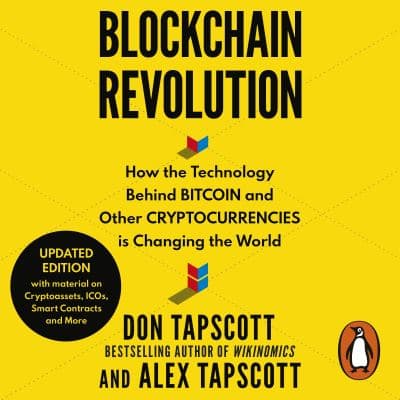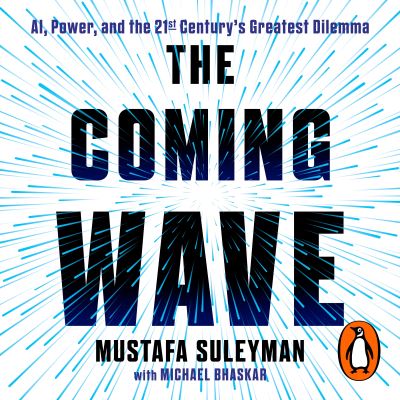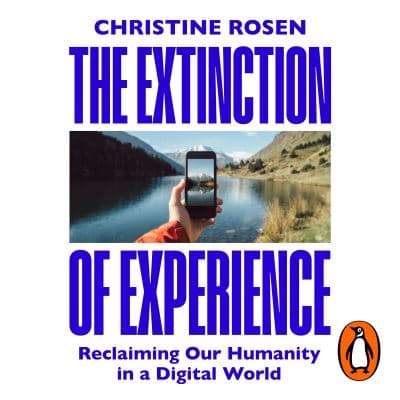Science - Technology
Read by: Jeanette Winterson
Duration: 8 hrs 59 mins
In this original, deeply researched and lively new book, Jeanette Winterson traces the history of the AI revolution. She talks to some of the boldest and most imaginative thinkers in the field and looks to religion, myth and literature to help us understand the radical changes to the way we live and love that are just around the corner.
When we create non-human life-forms, will we do so in our image? Or will we accept the once-in-a-species opportunity to remake ourselves in their image?What do love, caring and attachment look like with a non-biological life form? And what happens to the gender binary?What will happen when our destiny is not contained by physical bodies, and our destination is not planet Earth?With wit, compassion and curiosity, Winterson tackles AI's most urgent talking points, and asks readers to consider their role in imagining a more just and equal future.
Read by: Derek Perkins
Duration: 11 hrs 27 mins
Yuval Noah Harari takes us on a thrilling journey through today’s most urgent issues. How can we protect ourselves from nuclear war, ecological cataclysms and technological disruptions? What can we do about the epidemic of fake news or the threat of terrorism? What should we teach our children? Are we still capable of understanding the world we have created?
Read by: Fred Parker
Duration: 5 hrs
In these recollections of a vintage motorist, the author describes, with some humour, a collection of motoring memories.
Read by: Miscellaneous
Duration: 18 hrs 4 mins
AI will be the defining development of the twenty-first century. Within two decades, aspects of daily human life will be unrecognizable. AI will generate unprecedented wealth, revolutionize medicine and education through human-machine symbiosis, and create brand new forms of communication and entertainment. In liberating us from routine work, however, AI will also challenge the organizing principles of our economic and social order.
In this provocative, utterly original work of "scientific fiction," Kai-Fu Lee, the former president of Google China and bestselling author of AI Superpowers, joins forces with celebrated novelist Chen Qiufan to imagine our world in 2041 and how it will be shaped by AI. In ten gripping short stories, set twenty years in the future, they introduce readers to an array of eye-opening 2041 settings: In San Francisco, Tokyo and Seoul.
Read by: Rory Cellan-Jones
Duration: 10 hrs 17 mins
We live at a time when billions have access to unbelievably powerful technology. The most extraordinary tool that has been invented in the last century, the smartphone, is forcing radical changes in the way we live and work - and unlike previous technologies it is in the hands of just about everyone. Coupled with the rise of social media, this has ushered in a new era of deeply personal technology, where individuals now have the ability to work, create and communicate on their own terms. At least that is the optimistic view.
Always On takes readers on an entertaining ride through this turbulent era. It immerses the reader in the most important story of our times - the dramatic impact of hyperconnectivity, the smartphone and social media on everything from our democracy to our employment and our health.
Read by: Jot Davies
Duration: 3 hrs 26 mins
The past decade has witnessed extraordinary advances in artificial intelligence. But what precisely is it and where does its future lie? In this brilliant, one-stop guide WIRED journalist Matt Burgess explains everything you need to know about AI. He describes how it works. He looks at the ways in which it has already brought us everything from voice recognition software to self-driving cars, and explores its potential for further revolutionary change in almost every area of our daily lives. He examines the darker side of machine learning: its susceptibility to hacking; its tendency to discriminate against particular groups; and its potential misuse by governments. And he addresses the fundamental question: can machines become as intelligent as human beings?
Read by: Gretchen McCulloch
Duration: 8 hrs
Because Internet is for anyone who's ever puzzled over how to punctuate a text message or wondered where memes come from. It's the perfect book for understanding how the internet is changing the English language, why that's a good thing, and what our online interactions reveal about who we are. Language is humanity's most spectacular open-source project, and the internet is making our language change faster and in more interesting ways than ever before. Internet conversations are structured by the shape of our apps and platforms, from the grammar of status updates to the protocols of comments and @replies. Linguistically inventive online communities spread new slang and jargon with dizzying speed. What's more, social media is a vast laboratory of unedited, unfiltered words where we can watch language evolve in real time.
Read by: John Chancer
Duration: 17 hrs 54 mins
Blockchain is the ingeniously simple technology that powers cryptos. It is a public ledger to which everyone has access, but which no single person or institution controls. It allows for companies and individuals to collaborate with an unprecedented degree of trust and transparency. It is cryptographically secure, but fundamentally open. And it is everywhere.
In Blockchain Revolution, Don and Alex Tapscott reveal how this game-changing technology is re-shaping the global economy, how it is improving everything from healthcare records to online voting and how people everywhere are using it to side-step institutional barriers and take control of their future.
Read by: Michael Tudor Barnes
Duration: 15 hrs
Christian Wolmar describes the vision and determination of the pioneers who developed railways that would one day span continents, as well as the labour of the navvies who built this global network.
Read by: Roger Wayne
Duration: 11 hrs 30 mins
Tony Fadell led the teams that created the iPod, iPhone and Nest Learning Thermostat and learned enough in 30+ years in Silicon Valley about leadership, design, startups, Apple, Google, decision-making, mentorship, devastating failure and unbelievable success to fill an encyclopedia.
So that's what this book is. An advice encyclopedia. A mentor in a box.
Written for anyone who wants to grow at work - from young grads navigating their first jobs to CEOs deciding whether to sell their companies - Build is full of personal stories, practical advice and fascinating insights into some of the most impactful products and people of the 20th century.
Each quick 5-20 page entry builds on the previous one, charting Tony's personal journey from a product designer to a leader, from a startup founder to an executive to a mentor. Tony uses examples that are instantly captivating, like the process of building the very first iPod and iPhone. Every chapter is designed to help readers with a problem they're facing right now - how to get funding for their startup, whether to quit their job or not, or just how to deal with the jerk in the next cubicle.
Tony forged his path to success alongside mentors like Steve Jobs and Bill Campbell, icons of Silicon Valley who succeeded time and time again. But Tony doesn't follow the Silicon Valley credo that you have to reinvent everything from scratch to make something great. His advice is unorthodox because it's old school. Because Tony's learned that human nature doesn't change.
You don't have to reinvent how you lead and manage - just what you make. And Tony's ready to help everyone make things worth making.Read by: Ethan Mollick
Duration: 4 hrs 39 mins
Consumer AI has arrived. And with it, inescapable upheaval as we grapple with what it means for our jobs, lives and the future of humanity.
Cutting through the noise of AI evangelists and AI doom-mongers, Wharton professor Ethan Mollick has become one of the most prominent and provocative explainers of AI, focusing on the practical aspects of how these new tools for thought can transform our world. In Co-Intelligence, he urges us to engage with AI as co-worker, co-teacher and coach. Wide ranging, hugely thought-provoking and optimistic, Co-Intelligence reveals the promise and power of this new era.
Read by: Michael St. John
Duration: 12 hrs 15 mins
In 1821 mathematician Charles Babbage was so frustrated with checking manual mathematical tables that he embarked on a quest to design and build a mechanical calculating engine. His vision is all around us in today's sophisticated computers.
Read by: Michael Bhaskar
Duration: 11 hrs 48 mins
Soon you will live surrounded by AIs. They will organise your life, operate your business, and run core government services. You will live in a world of DNA printers and quantum computers, engineered pathogens and autonomous weapons, robot assistants and abundant energy. None of us are prepared. As co-founder of the pioneering AI company DeepMind, part of Google, Mustafa Suleyman has been at the centre of this revolution. The coming decade, he argues, will be defined by this wave of powerful, fast-proliferating new technologies.
In The Coming Wave, Suleyman shows how these forces will create immense prosperity but also threaten the nation-state, the foundation of global order. As our fragile governments sleepwalk into disaster, we face an existential dilemma: unprecedented harms on one side and the threat of overbearing surveillance on the other. Can we forge a narrow path between catastrophe and dystopia?Read by: Andrew Cullum
Duration: 10 hrs
Jonathan Glancey traces the development of Concorde from the moment Captain Chuck Yeager first broke the sound barrier in 1947 through to the last commercial flight of the supersonic airliner in 2003. He uses not only existing material and archives, but also interviews with those who lived with the supersonic project from its inception.
Read by: John Hobday
Duration: 6 hrs
David McMullan looks back and traces the difficulties and triumphs of the Kent-based specialist car conversion company, from its earliest beginnings to its final sale on his retirement in 1987. His account is a warm and often touching story of grit, determination and tireless innovation, leading to their success in a hugely competitive global market.
Read by: Victoria Turk
Duration: 5 hrs 19 mins
How do you reply to your colleague's weird email? What might Debrett's say about your Tinder profile? And just how do you know if you're mansplaining? In this irreverent journey through the murky world of digital etiquette, WIRED's Victoria Turk provides an indispensable guide to minding our manners in a brave new online world.
The digital revolution has put us all within a few clicks, taps and swipes of each other. But familiarity can breed contempt, and whilst we're more likely than ever to fall in love online, we're also more likely to fall headfirst into a blazing row with a stranger. Google's unofficial motto is Don't Be Evil, but sometimes that's easier said than done. If you've ever encountered the surreal battlefields of digital life and wondered why we don't all just go analogue, this is the book for you.
Read by: Will Damron
Duration: 7 hrs
Do you find yourself endlessly scrolling through social media or the news while your anxiety rises? Are you feeling frazzled after a long day of endless video calls? In this timely book, professor Cal Newport shows us how to pair back digital distractions and live a more meaningful life with less technology. By following a 'digital declutter' process, you'll learn to: Rethink your relationship with social media. Prioritize 'high bandwidth' conversations over low quality text chains. Rediscover the pleasures of the offline world. Take back control from your devices and find calm amongst the chaos with Digital Minimalism.
Read by: Rachel Fulginiti
Duration: 11 hrs 58 mins
Today Google and Facebook receive 90% of the world's news ad-spending. Amazon takes half of all ecommerce in the US. Google and Apple operating systems run on all but 1% of cell phones globally. And 80% of corporate wealth is now held by 10% of companies - not the GEs and Toyotas of this world, but the digital titans. How did we get here? How did the tech industry get to dominate our world so completely? How did once-idealistic and innovative companies come to manipulate elections, violate our privacy, and pose a threat to the fabric of our democracy? In Don't Be Evil, Financial Times global business columnist Rana Foroohar documents how Big Tech lost its soul - and became the new Wall Street.
Read by: Richard Burnip
Duration: 9 hrs
Cliff Todd devoted his life to bringing bomb makers to justice. He and his colleagues at the Ministry of Defence's Forensic Explosives Laboratory are the unsung heroes of terrorist bomb attacks - the men and women in white suits who piece together who planted the bombs, what a device consisted of and how the perpetrators might give themselves away.
They played a pivotal role in uncovering the secrets behind some of the world's most horrifying terrorist outrages. Explosive tells the stories of these high-profile cases and details, for the first time, the contribution Todd and his team made in tracking down bombers during a time when Britain was under attack first by the IRA and then by Islamic extremists inspired by al-Qaeda.
Explosive takes the reader into the murky world of the amateur bomb maker, and reveals what Todd's department achieved in many now infamous attacks, including the device concealed in a radio cassette player that brought down Pan Am Flight 103 over Lockerbie, the IRA attacks on Warrington in Cheshire, the Bali nightclub bombings of 2002, and the 7/7 onslaught in central London that claimed 56 lives and injured 784 others in 2005.
In Explosive, Todd takes us step by step through the investigations, explaining the chemistry, the forensic work and the emotional toll on him and his staff as they sought to recreate and understand what had happened at some of the most shocking tragedies in modern peacetime history.Read by: Azeem Azhar
Duration: 9 hrs 43 mins
We are entering the Exponential Age.
Between faster computers, better software and bigger data, ours is the first era in human history in which technology is constantly accelerating. Azeem Azhar - writer, technologist, and creator of the acclaimed Exponential View newsletter - understands this shift better than anyone. Technology, he argues, is developing at an increasing, exponential rate. But human society - from our businesses to our political institutions - can only ever adapt at a slower, incremental pace. The result is an 'exponential gap' - between the power of new technology and humans' ability to keep up.
In Exponential, Azhar shows how this exponential gap can explain our society's most pressing problems. The gulf between established businesses and fast-growing digital platforms. The inability of nation states to deal with new forms of cyberwarfare. And the sclerotic response of liberal democracies to fast-moving social problems. But the exponential gap is not inevitable. Drawing on fields as varied as economics, political science and psychology, Azhar sketches out how we can harness the power of tech to serve our real needs - fostering new ways of doing business, innovative forms of politics, and fresh approaches to national defence.
Read by: Suzie Althens
Duration: 8 hrs 42 mins
Drawing on decades of research, The Extinction of Experience is a philosophical defence of what makes us human – and a powerful, urgent call to reclaim ourselves in a digital world.
Human experiences are disappearing. Social media, gaming and dating apps have usurped in-person interaction; handwriting is no longer prioritised in schools; and emotion is sooner expressed through likes and emojis than face-to-face conversations. With headphones in and eyes trained on our phones, even boredom has been obliterated. But, as Christine Rosen expertly shows, when we embrace this mediated life and conform to the demands of the machine, we risk becoming more disconnected and machine-like ourselves.
There is another way. To improve our well-being, help future generations flourish and recover our shared humanity, we must become more critical, mindful users of technology, and more discerning of how it uses us.
Read by: Jonathan Todd Ross
Duration: 15 hrs 9 mins
It's a signal paradox of our times that we live in an information society but do not know how it works. And without understanding how our information is stored, used and protected, we are vulnerable to having it exploited. In Fancy Bear Goes Phishing, Scott Shapiro exposes the secrets of the digital age. With lucidity and wit, he establishes that cybercrime has less to do with defective programming than with the faulty wiring of our psyches and society. And because hacking is a human story, he tells the fascinating tales of perpetrators including Robert Morris Jr, the graduate student who accidentally crashed the internet in the 1980s, and the Bulgarian 'Dark Avenger' who invented the first mutating computer-virus engine.
We also meet a sixteen-year-old from South Boston who took control of Paris Hilton's cell phone and the Russian intelligence officers who sought to take control of a US election, among others. In telling their stories, Shapiro exposes the hackers' tool kits and gives fresh answers to vital questions: why is the internet so vulnerable? What can we do in response? The result is a lively and original account of the future of hacking, espionage and war, and of how to live in an era of cybercrime.
Read by: Dana Thomas
Duration: 9 hrs 15 mins
Today, one out of six people on earth work in fashion, churning out 100 billion garments a year. Yet 98 percent of them do not earn a living wage, and 2.1 billion tonnes of clothing is thrown away annually. Veteran journalist Dana Thomas details the damage wrought by fashion's powerful organizations, and celebrates the visionaries – including activists, artisans, designers, and tech entrepreneurs – fighting for change.
Read by: Chloe Cannon
Duration: 9 hrs
The boundary that once protected our intimate lives from outside interests is an artefact of the 20th century. In the 21st, we have embraced a vast array of technology that enables constant access and surveillance of the most private aspects of our lives. From non-consensual pornography, to online extortion, to the sale of our data for profit, we are vulnerable to abuse. As Citron reveals, wherever we live, laws have failed miserably to keep up with corporate or individual violators, letting our privacy wash out with the technological tide. And the erosion of intimate privacy in particular, Citron argues, holds immense toxic power to transform our lives and our societies for the worse (and already has).
Read by: Christian Wolmar
Duration: 14 hrs 30 mins
The rise of the steam train allowed goods and people to circulate around Britain as never before, stimulating the growth of towns and industry. From the early days of steam to electrification, this book examines the social and economical importance of the railway and how it helped to form the Britain of today.
Read by: John Hobday
Duration: 10 hrs
The Piper Alpha oil platform, 110 miles northeast of Aberdeen, was once the world's single largest oil producer. On 6 July 1988, its final day, it was ablaze with 226 men onboard. Only sixty-one would survive. This is the moving and vivid tale of what happened on that fateful night inside the oil rig inferno.
Read by: Kaleo Griffith
Duration: 7 hrs 46 mins
Don't just think deep, think wide. From pandemics to populism, AI to ISIS, wealth inequity to climate change, humanity faces unprecedented challenges that threaten our very existence. But how we see them affects how we respond and lets us uncover hidden options that expand our thinking. In this bold, optimistic book, the authors of the bestselling Big Data show how humans have a unique cognitive ability to frame - to create mental models that allow us to spot patterns, make predictions and grasp new situations. While computers may now excel at reasoning and judgement, framing is unique to humans. This book is the first guide to mastering an essential skill for the 21st century.
Read by: Esh Alladi
Duration: 7 hrs 29 mins
Shining a light on the technology currently being developed to revolutionise communication, The Future of Language distinguishes myth from reality and superstition from scientifically-based prediction as it plots out the importance of language and raises questions about its future.
From the rise of artificial intelligence and speaking robots, to brain implants and computer-facilitated telepathy, language and communications expert Philip Seargeant surveys the development of new digital 'languages', such as emojis, animated gifs and memes, and investigates how conventions of spoken and written language are being modified by new trends in communication.
Questioning the potential ramifications of recent and future developments in communication on society and its ideals, The Future of Language is a no holds barred investigation into the state of civilisation and the impact that changes in language could have on our lives.
Read by: John Lee
Duration: 9 hrs 59 mins
The Genius Makers tells the story of AI from pioneering days to current achievements to future potential. At the same time it takes the lid off what has effectively become an arms race between Google, Microsoft, Facebook and OpenAI, in which Google may be the clear frontrunner at present, but Facebook has shown itself to be both nimble and innovative, and OpenAI, the company recently founded by Elon Musk and Sam Altman, has made itself the confident upstart of the pack. Each of these companies represents something unique in the development of a technology that offers both extraordinary potential and extraordinary risks. Their personalities and business strategies are already changing the tech landscape in dramatic ways. And they will continue to do so.
As well as explaining and exploring artificial intelligence and showing how individuals and companies are reaching for it, The Genius Makers also poses serious ethical questions about the technology. Should we even be pursuing it? How will strong AI change humanity? Will it carve out a giant hole in our job market? Are these companies blinded by the riches this technology will bring? Are they forgetting the existential realities of creating machines that behave like humans? Written by an expert who has exclusive access to each of these companies - and others who are working in this field - this is a rich, character-driven narrative that captures an extraordinary moment in the history of technology.Read by: Rana el Kaliouby
Duration: 11 hrs 43 mins
We are entering an empathy crisis. Most of our communication is conveyed through non-verbal cues - facial expressions, tone of voice, body language - nuances that are completely lost when we interact through our smartphones and other technology. The result is a digital universe that's emotion-blind - a society lacking in empathy. Rana al Kaloubi discovered this when she left Cairo, a newly-married, Muslim woman, to take up her place at Cambridge University to study computer science. Many thousands of miles from home, she began to develop systems to help her better connect with her family.
She started to pioneer the new field of Emotional Intelligence (EI). She now runs her company, Affectiva (the industry-leader in this emerging field) that builds EI into our technology and develops systems that understand humans the way we understand one another.
Read by: Robin Miles
Duration: 10 hrs 45 mins
Before Neil Armstrong walked on the moon, a group of dedicated female mathematicians known as “human computers” calculated the numbers that would launch rockets into space. Among these were a group of exceptionally talented African American women, and even though they were segregated from their white counterparts, the women helped America achieve a decisive victory over the Soviet Union. These four African American women participated in some of NASA’s greatest successes.
Read by: Douglas Adams & Mitch Benn
Duration: 3 hrs 11 mins
Douglas Adams was a passionate technology enthusiast. His bestselling The Hitchhiker's Guide to the Galaxy is full of futuristic tech, and in 1990 he predicted something very like the World Wide Web. So in 1999, he was the natural choice to present Radio 4's The Internet: The Last 20th Century Battleground. In it, he looked at the explosion in online communication, the evolution of cyberspace, and the risks and opportunities of the new virtual world.
A year later, he hosted The Hitchhiker's Guide to the Future, in which he and his guests discussed how music, publishing, broadcasting, and society in general would be transformed in the 21st century. Sadly, his death in 2001 meant he would never see if his visions came true. However, in 2015, Mitch Benn revisited Adams' predictions to discover how prescient (or otherwise) they turned out to be...
Read by: Joe Jameson
Duration: 9 hrs 47 mins
Our search engines are becoming answer engines. Artificial intelligence is already revolutionising sectors from education to healthcare to the creative arts. But how does an AI understand sentiment or context? How does it play and win games that have an almost infinite number of moves? And how can we work with AI to produce insights and innovations that are beyond human capacity, from writing code in an instant to unfolding the elaborate 3D puzzles of proteins?
We stand at the brink of a historic change that will disrupt society and at the same time create enormous opportunities for those who understand how AI thinks. Nigel Toon shows how we train AI to train itself, so that it can paint images that have never existed before or converse in any language. In doing so he reveals the strange and fascinating ways that humans think, too, as we learn how to live in a world shared by machine intelligences of our own creation.
Read by: Dani Martineck
Duration: 5 hrs 53 mins
John Maeda is one of the world's preeminent thinkers on technology and design, and in How to Speak Machine, he offers a set of simple laws that govern not only the computers of today, but the unimaginable machines of the future. Machines are already more powerful than we can comprehend, and getting more powerful at an exponential pace. Once set in motion, algorithms never tire. And when a program's size, speed and endlessness combine with its ability to learn and transform itself, the outcome can be unpredictable and dangerous.
Drawing on his wide-ranging experience from engineering to computer science to design, Maeda shows how businesses and individuals can identify opportunities afforded by technology to make world-changing and inclusive products while avoiding the pitfalls inherent to the medium.
Read by: Seyi Akiwowo
Duration: 7 hrs 30 mins
Digital spaces are a positive force for change, connection and community, but left unregulated, they are not always safe. Globally, women are 27 times more likely than men to be harassed online. 78% of LGBTQ+ people have experienced hate crime and hate speech online and there has been a 71% rise in online disability abuse.
How to Stay Safe Online will teach you how to spot, respond to, and protect yourself from online abuse and learn how to be a good ally to those experiencing it. An urgent and necessary digital self-care tool, this book will help you to support victims and empower friends, teachers, parents and willing allies to report abuse to social media companies and make online spaces safer.
With a blend of practical advice, Seyi's personal experiences and potential interviews with Hera Hussain, Gabby Edlin, Laura Bates, Yassmin Abdel, Diane Abbott, How to Stay Safe Online will:
* Provide practical tips on how to confidently navigate online spaces
* Teach you how to report and react to online abuse
* Provide information for employers, parents and teachers
* Teach you how to set boundaries and use the internet as a force for good
* Help you create your own digital self-care plan
This will be the go-to guide to developing resilience, compassion and allyship online.Read by: Justin Avoth
Duration: 9 hrs
Is more data always better?
Do algorithms really make better decisions than humans?
Can we stay in control in an increasingly automated world?
Drawing on decades of research into decision-making under uncertainty, Gerd Gigerenzer makes a compelling case for the enduring importance of human discernment in an automated world that we are told can - and will - replace our efforts.
From dating apps and self-driving cars to facial recognition and the justice system, the increasing presence of AI has been widely championed - but there are limitations and risks too. Humans are the greatest source of uncertainty in these situations and Gigerenzer shows how, when people are involved, trust in complex algorithms can lead to illusions of certainty that become a recipe for disaster.
Filled with practical examples and cutting-edge research, How to Stay Smart in a Smart World examines the growing role of AI at all levels of daily life with refreshing clarity. This book is a liferaft in a sea of information and an urgent invitation to actively shape the digital world in which we want to live.
- Previous<
- Page1
- Page2
- Page3
- Next>
































